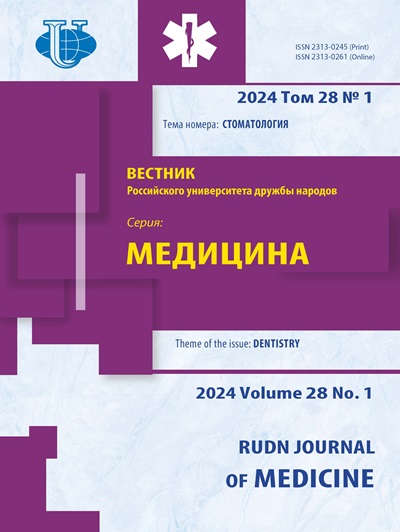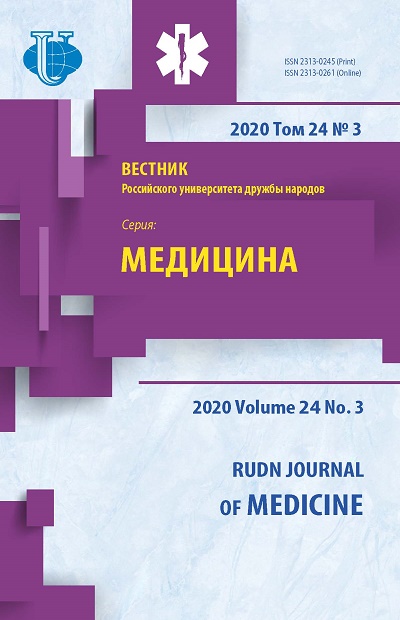Main methods of psychotherapy for negative schizophrenia symptoms
- Authors: Munin A.O1, Akulova A.A2, Belokrylov I.V1
-
Affiliations:
- Peoples’ Friendship University of Russia (RUDN University)
- State Psychiatric Hospital № 4
- Issue: Vol 24, No 3 (2020)
- Pages: 262-268
- Section: PSYCHIATRY
- URL: https://journals.rudn.ru/medicine/article/view/24441
- DOI: https://doi.org/10.22363/2313-0245-2020-24-3-262-268
Cite item
Full Text
Abstract
The review covers publications on the main methods of psychotherapy that can reduce negative symptoms of schizophrenia. Negative symptoms are difficult to treat, and generally persist despite standard antipsychotic treatment. Combined methods including medical and non-medical treatments can be more effective and fully meet the therapeutic needs of a patient. We examined the effects of cognitive-behavioral therapy, social skills training, and family interventions on negative symptoms. The negative symptoms of schizophrenia underlie poor functioning, impaired professional performance and patient disability, thereby being a key factor in the enormous financial cost to the healthcare. Effective treatment of negative symptoms will lead to clinical and functional recovery in patients with schizophrenic spectrum disorders.
About the authors
A. O Munin
Peoples’ Friendship University of Russia (RUDN University)
Author for correspondence.
Email: Munin1@mail.ru
Moscow, Russian Federation
A. A Akulova
State Psychiatric Hospital № 4
Email: Munin1@mail.ru
Moscow, Russian Federation
I. V Belokrylov
Peoples’ Friendship University of Russia (RUDN University)
Email: Munin1@mail.ru
Moscow, Russian Federation
References
- Ho B.C., Nopoulos P., Flaum M., Arndt S., Andreasen N.C. Twoyear outcome in first-episode schizophrenia: predictive value of symptoms for quality of life. Am J Psychiatry. 1998;155(9):1196 doi: 10.1176/ajp.155.9.1196
- Rabinowitz J., Levine SZ., Garibaldi G., Bugarski-Kirola D., Berardo CG., Kapur S. Negative symptoms have greater impact on functioning than positive symptoms in schizophrenia: analysis of CATIE data. Schizophr Research. 2012;137(1—3):147—150. doi: 10.1016/j.schres.2012.01.015
- Jordan G., Lutgens D., Joober R., Lepage M., Iyer S.N., Malla A. The relative contribution of cognition and symptomatic remission to functional outcome following treatment of a first episode of psychosis. The Journal of Clinical Psychiatry. 2014;75(6):556—572. doi: 10.4088/JCP.13m08606
- Patel R., Jayatilleke N., Broadbent M. et al. Negative symptoms in schizophrenia: a study in a large clinical sample of patients using a novel automated method. BMJ Open. 2015;5(9) doi: 10.1136/bmjopen-2015—007619
- Fusar-Poli P., Papanastasiou E., Stahl D., Rocchetti M., Carpenter W., Shergill S. et al. Treatments of Negative Symptoms in Schizophrenia: Meta-Analysis of 168 Randomized PlaceboControlled Trials. Schizophrenia Bulletin. 2015; 41(4):892—899. doi: 10.1093/schbul/sbu170
- Kirkpatrick B., Fenton W.S., Carpenter W.T. Jr., Marder S.R. The NIMH-MATRICS consensus statement on negative symptoms. Schizophrenia Bulletin. 2006; 32(2): 214—219. DOI:10.1093/ schbul/sbj053
- Strauss G.P., Horan W.P., Kirkpatrick B. et al. Deconstructing negative symptoms of schizophrenia: avolition-apathy and diminished expression clusters predict clinical presentation and functional outcome. Journal of Psychiatric Research. 2013; 47(6): 783—790. doi: 10.1016/j.jpsychires.2013.01.015
- Bobes J., Arango. C., Garcia-Garcia M., Rejas J. Prevalence of negative symptoms in outpatients with schizophrenia spectrum disorders treated with antipsychotics in routine clinical practice: findings from the CLAMORS study. The Journal of clinical psychiatry. 2010; 71(3): 280—286. DOI:10.4088/ JCP.08m04250yel
- Kirkpatrick B., Buchanan R.W., Ross D.E., Carpenter W.T. Jr. A separate disease within the syndrome of schizophrenia. Archives of General Psychiatry. 2001; 58(2): 165—171. DOI: 10.1001/ archpsyc.58.2.165
- Buchanan R.W. Persistent negative symptoms in schizophrenia: an overview. Schizophrenia bulletin. 2007; 33(4): 1013—1022. doi: 10.1093/schbul/sbl057
- Klingberg S., Wolwer W., Engel C., Wittorf A., Herrlich J., Meisner C. et al. Negative Symptoms of Schizophrenia as Primary Target of Cognitive Behavioral Therapy: Results of the Randomized Clinical TONES Study. Schizophrenia bulletin. 2011; 37(2):98—110. doi: 10.1093/schbul/sbr073
- Buchanan R.W., Kreyenbuhl J., Kelly D.L., Noel J.M., Boggs D.L., Fischer B.A., et al. The 2009 schizophrenia PORT psychopharmacological treatment recommendations and summary statements. Schizophrenia bulletin. 2010; 36(1): 71—93. doi: 10.1093/schbul/sbp116
- Kholmogorova A.B., Rychkova O.V. Narusheniya soczialnogo poznaniya. Novaya paradigma v issledovaniyakh czentralnogo psikhologicheskogo deficzita pri shizofrenii. Moscow. FORUM. 2016 (In Russ)
- Elis O., Caponigro J.M., Kring A.M. Psychosocial Treatments for Negative Symptoms in Schizophrenia: Current Practices and Future Directions. Clinical psychology review. 2013; 33(8): 914—928. doi: 10.1016/j.cpr.2013.07.001
- Hiltunen A.J., Kocys E., Perrin-Wallqvist R. Effectiveness of cognitive behavioral therapy: An evaluation of therapies provided by trainees at a university psychotherapy training center. PsyCh journal. 2013; 2(2): 101—112. doi: 10.1002/pchj.23
- Hofmann S.G., Asnaani A., Vonk I.J., Sawyer A.T., Fang A. The Efficacy of Cognitive Behavioral Therapy: A Review of Metaanalyses. Cognitive therapy and research. 2012; 36 (5): 427—440. doi: 10.1007/s10608—012—9476—1
- Aleman A., Lincoln T., Bruggeman R., Melle I., Arends J., Arango C., et al. Treatment of negative symptoms: Where do we stand, and where do we go? Schizophr Research. 2017; 186: 55—62. doi: 10.1016 / j. schres.2016.05.015
- Lutgens D., Gariepy G., Malla A. Psychological and psychosocial interventions for negative symptoms in psychosis: systematic review and meta-analysis. The British Journal of Psychiatry. 2017; 210 (5): 324—332. doi: 10.1192/bjp.bp.116.197103
- Staring A.B., Ter Huurne M.A., van der Gaag M. Cognitive Behavioral Therapy for negative symptoms (CBT-n) in psychotic disorders: A pilot study. J Behav Ther Exp Psychiatry. 2013; 44(3): 300—306. doi: 10.1016/j.jbtep.2013.01.004
- Brown G.W., Birley J.L., Wing J.K. Influence of family life on the course of schizophrenic disorders: a replication. British Journal of Psychiatry. 1972; 121(562) 241—258. doi: 10.1192/bjp.121.3.241
- National Collaborating Centre for Mental Health., National Institute for Health and Care Excellence. Psychosis and Schizophrenia in Adults: Treatment and Management: Updated Edition. NICE Clinical Guidelines 2014; 178
- Huxley N.A., Rendall M., Sederer L. Psychosocial treatments in schizophrenia: a review of the past 20 years. The Journal of Nervous and Mental Disease. 2000; 188(4) 187—201. doi: 10.1097/00005053—200004000—00001
- McFarlane W.R., Dixon L., Lukens E., Lucksted A., Family psychoeducation and schizophrenia: a review of the literature. Journal of marital and family therapy. 2003; 29(2): 223—245. doi: 10.1111/j.1752—0606.2003.tb01202.x
- Landyshev M.A. Psychoeducation of family members of schizophrenic patients with frequent hospitalizations. Socialnaya i klinicheskaya psihiatriya. 2006 16 (3): 99—103. (In Russ)
- Dyck D.G., Short R.A., Hendryx M.S., Norell D., Myers M., Patterson T. et al. Management of Negative Symptoms among Patients with Schizophrenia Attending Multiple-Family Groups. Psychiatric Services. 2000; 51(4) 513—519. doi: 10.1176/appi. ps.51.4.513
- Turner D.T., van der Gaag M., Karyotaki E., Cuijpers P. Psychological interventions for psychosis: a meta-analysis of comparative outcome studies. American Journal of Psychiatry. 2014; 171(5): 523—538. doi: 10.1176/appi.ajp.2013.13081159
















